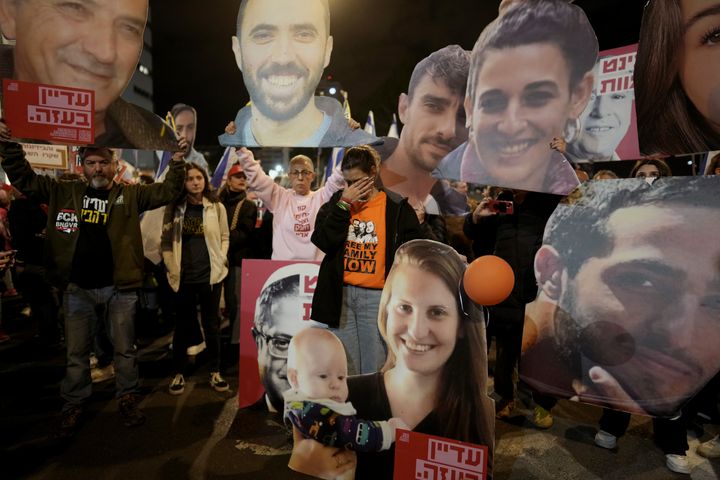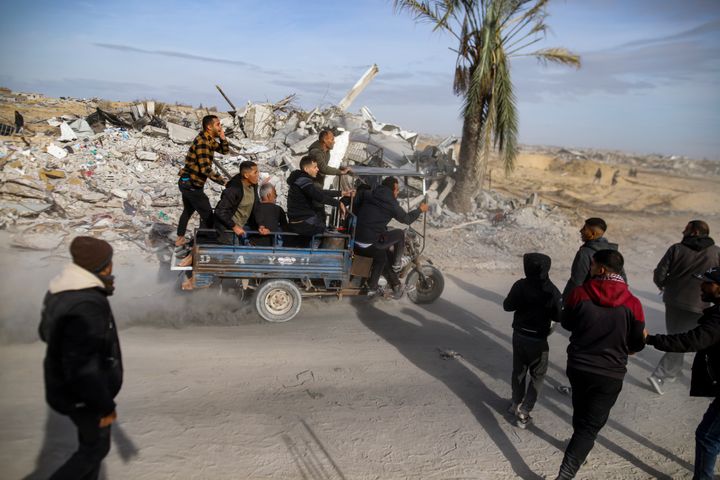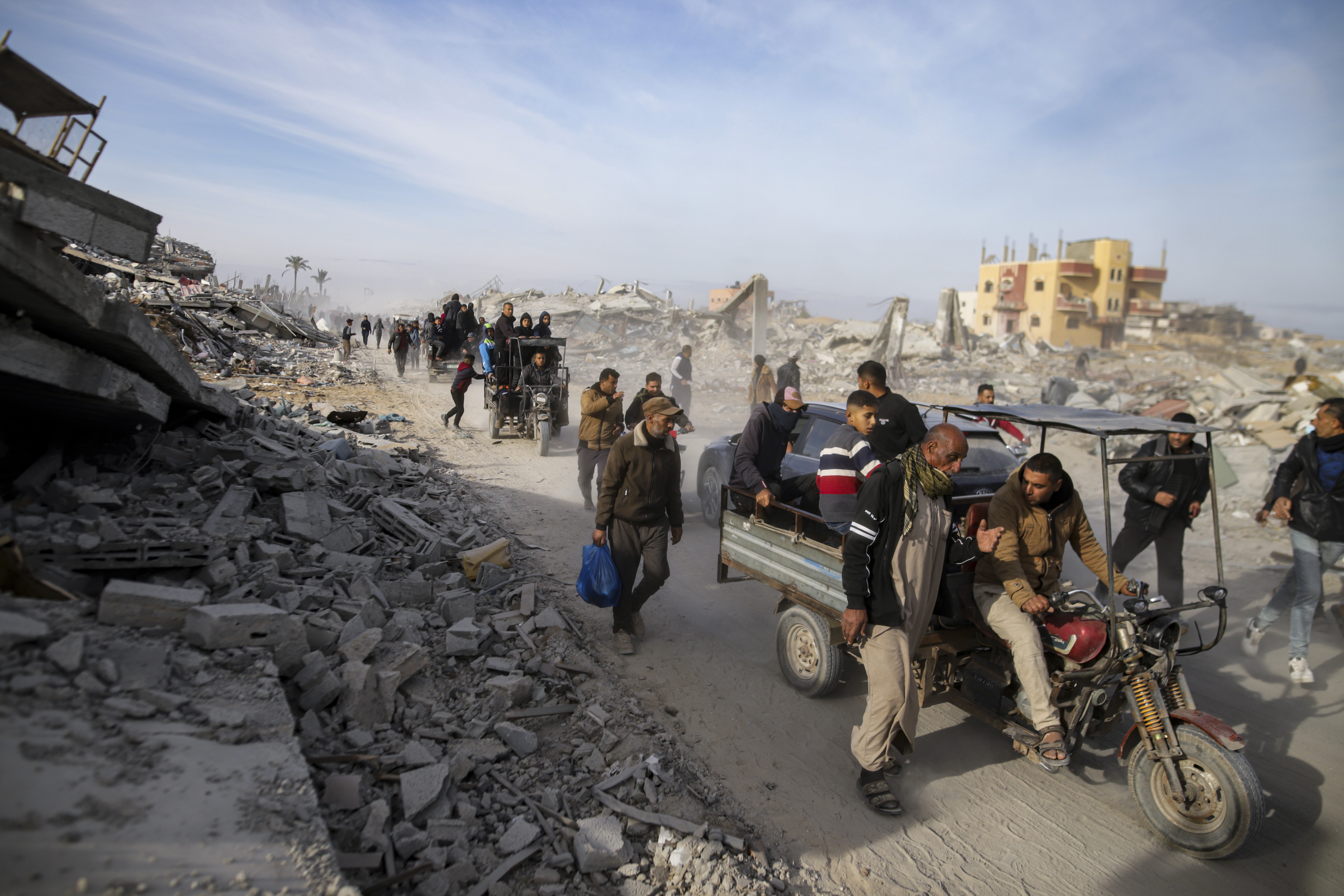Gaza Ceasefire In Effect After Delay As Hamas Names Hostages To Be Released Sunday
DEIR AL-BALAH, Gaza Strip (AP) — A long-awaited cease-fire in Gaza has begun after a nearly three-hour delay. The truce was postponed after Hamas did not name the three hostages it plans to release later on Sunday.
Israel vowed to keep fighting until it received the names, which were posted on social media by Hamas’ armed wing around two hours later. That appeared to pave the way for the start of the ceasefire, which Israel said would begin at 11:15 a.m. local time.
Advertisement
THIS IS A BREAKING NEWS UPDATE. AP’s earlier story follows below.
Hamas named the three hostages it plans to release on Sunday more than two hours after the ceasefire in Gaza was supposed to have begun. Israel had earlier said it would keep fighting until it received the names.
There was no immediate comment from Israel after Hamas’ armed wing posted the names of the three female hostages on social media.
Celebrations erupted across the war-ravaged territory, and some Palestinians began returning to their homes, even as the delay underscored the fragility of the agreement. The deal sets in motion a long and uncertain process aimed at ultimately ending the war and returning nearly 100 hostages abducted in the Oct. 7, 2023 Hamas attack that triggered it.
Advertisement
Israeli Prime Minister Benjamin Netanyahu said earlier Hamas had not lived up to its commitment to provide the names of the three hostages it was set to release in exchange for scores of Palestinian prisoners.
The names of the three hostages had not been handed over when the deadline for the truce to begin passed at 8:30 a.m. local time, Rear Adm. Daniel Hagari, the top Israeli military spokesman, said. He said the army “continues to attack, even now, inside the Gaza arena,” and would until Hamas complies with the agreement.
The military later said it had struck a number of militant targets in northern and central Gaza.
An Israeli airstrike killed at least eight people in the southern city of Khan Younis after the ceasefire was delayed. Nasser Hospital confirmed the casualties from Sunday’s strike, which it said had occurred around two hours after the truce was supposed to take effect.
Advertisement
Gaza’s Health Ministry reported another three deaths from strikes on Sunday in Gaza City.
Hamas had earlier blamed the delay in handing over the names on “technical field reasons.” It said in a statement that it is committed to the ceasefire deal announced last week.
An Israeli official said mediators have provided assurances that the list will be delivered and the deal is still expected to go forward, though the timing remains in question. The official spoke on condition of anonymity because of the ongoing efforts to resolve the matter.

Oded Balilty via AP
Advertisement
The party of Israel’s hard-line National Security Minister Itamar Ben-Gvir meanwhile said its Cabinet ministers submitted their resignations from the government on Sunday in opposition to the ceasefire. The departure of the Jewish Power party weakens Netanyahu’s coalition but will not affect the ceasefire.
In a separate development, Israel announced that it had recovered the body of Oron Shaul, a soldier who was killed in the 2014 Israel-Hamas war, in a special operation. The bodies of Shaul and another soldier, Hadar Goldin, remained in Gaza after the 2014 war and had not been returned despite a public campaign by their families.
Delay underscores fragility of the agreement
The planned ceasefire, agreed after a year of intensive mediation by the United States, Qatar and Egypt, is the first step in a long and fragile process aimed at winding down the 15-month war.
Advertisement
Netanyahu said he had instructed the military that the ceasefire “will not begin until Israel has in its possession the list of hostages to be freed, which Hamas committed to provide.” He had issued a similar warning the night before.
The 42-day first phase of the ceasefire should see a total of 33 hostages returned from Gaza and hundreds of Palestinian prisoners and detainees released. Israeli forces should pull back into a buffer zone inside Gaza, and many displaced Palestinians should be able to return home. The devastated territory should also see a surge in humanitarian aid.
This is just the second ceasefire in the war, longer and more consequential than the weeklong pause over a year ago, with the potential to end the fighting for good.
Advertisement
Negotiations on the far more difficult second phase of this ceasefire should begin in just over two weeks. Major questions remain, including whether the war will resume after the six-week first phase and how the rest of the nearly 100 hostages in Gaza will be freed.
Palestinians celebrate despite delay
Dozens of people took to the streets in Gaza’s southern city of Khan Younis to celebrate the ceasefire, according to an Associated Press reporter. Four masked and armed Hamas fighters arrived in two vehicles as the celebrations were underway, with people welcoming them and chanting slogans in support of the militant group.
Gaza’s Civil Defense, first responders who operate under the Hamas-run government, held a parade in Gaza City, where the rescuers waved a Palestinian flag alongside other revelers, according to AP footage, which also showed a small group of people carrying the flags of Islamic Jihad, the second largest militant group after Hamas, which took part in the Oct. 7 attack.
Advertisement
The Hamas-run police began deploying in public after mostly lying low due to Israeli airstrikes. Gaza City residents said they had seen them operating in parts of the city, and the AP reporter in Khan Younis saw a small number out on the streets.
Palestinian residents began returning to their homes in parts of Gaza City early Sunday, even as tank shelling continued to the east, closer to the Israeli border, overnight. Families could be seen making their way back on foot, with their belongings loaded on donkey carts, residents said.
“The sound of shelling and explosions didn’t stop,” said Ahmed Matter, a Gaza City resident. He said he saw many families leaving their shelters and returning to their homes. “People are impatient. They want this madness to end,” he said.
Advertisement

Jehad Alshrafi via AP

Jehad Alshrafi via AP
Israel’s Cabinet approved the ceasefire early Saturday in a rare session during the Jewish Sabbath, more than two days after mediators announced the deal. The warring sides were under pressure from both the outgoing Biden administration and President-elect Donald Trump to achieve a deal before the U.S. presidential inauguration on Monday.
Advertisement
The toll of the war has been immense, and new details on its scope will now emerge.
Over 46,000 Palestinians have been killed, according to Gaza’s Health Ministry. The Oct. 7, 2023, Hamas-led attack on southern Israel that sparked the war killed over 1,200. Hundreds of Israeli soldiers have died.
Some 90% of Gaza’s population has been displaced. The United Nations says the health system, road network and other vital infrastructure have been badly damaged. Rebuilding – if the ceasefire reaches its final phase – will take several years at least. Major questions about Gaza’s future, political and otherwise, remain unresolved.
Magdy reported from Cairo and Goldenberg from Tel Aviv, Israel. Associated Press reporters Josef Federman in Jerusalem and Mohammad Jahjouh in Khan Younis, Gaza Strip, contributed to this report.
Advertisement
Follow AP’s war coverage at https://apnews.com/hub/israel-hamas-war

Comments are closed.